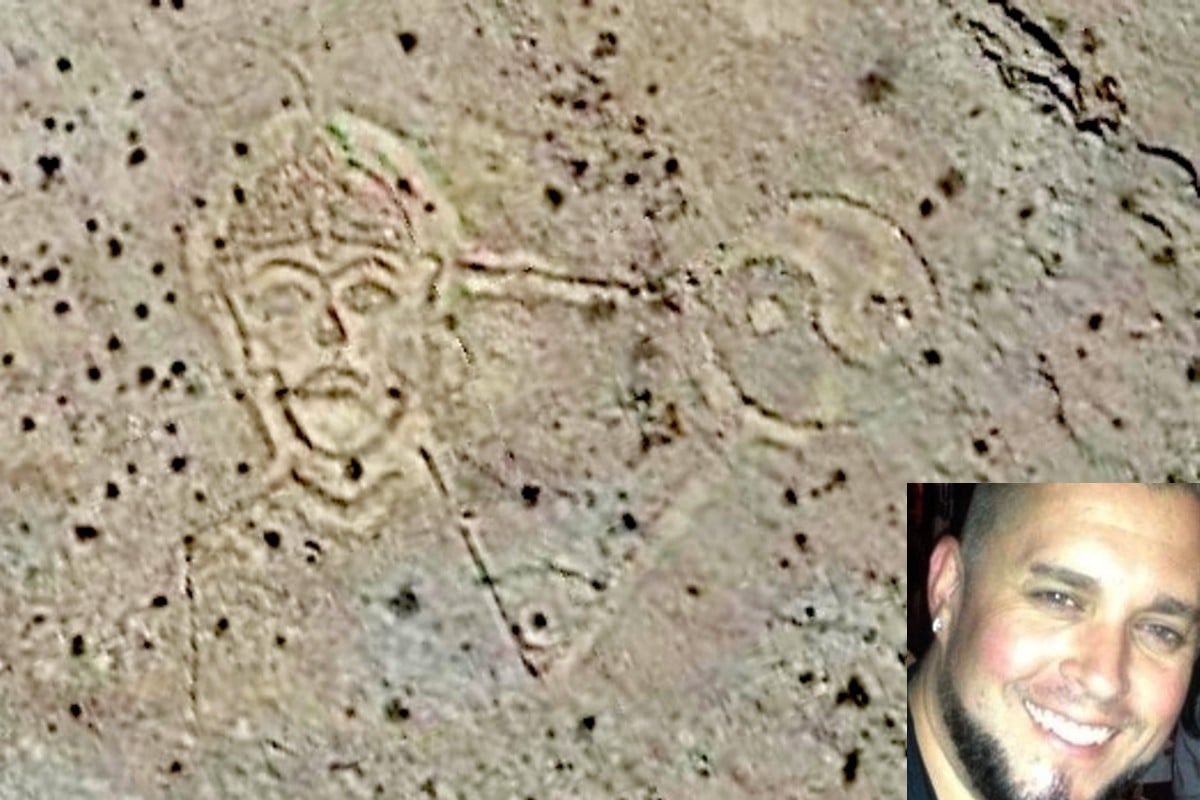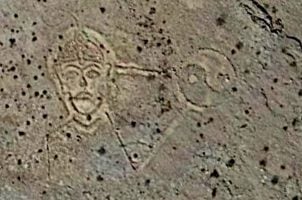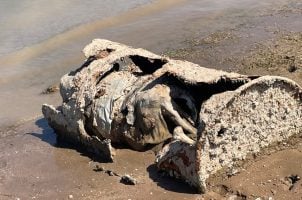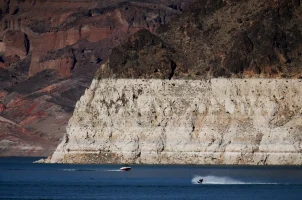Mystery Las Vegas Mountaintop Land Artist Revealed
Posted on: March 3, 2023, 02:09h.
Last updated on: March 6, 2023, 01:00h.
Someone has claimed the mysterious work of land art discovered two months ago on a mountain plateau overlooking southwestern Las Vegas. Matt Jones, a 47-year-old massage therapist and father of five, came forward to the Las Vegas Review-Journal.

The work connects a 75-foot-long triangle to a yin-yang symbol on one side and a monkey’s face on the other. Completely invisible when standing inside of it, it was only discovered by chance when David Golan, a sports doctor who lives nearby, noticed the rocks forming odd shadows as he and his wife walked their dogs past them. When Golan got home, he fired up Google Earth.
Jones explained that he began creating the piece in late 2016, during hikes he took up to the hills behind his former home just west of South Fort Apache Road and Cactus Avenue.
Some have dubbed it “The Desert Monkey King,” though Jones said he never gave it a name.
Finding Inspiration
Jones said his creation was inspired by a documentary about the Nazca Lines, large images constructed of lines in the Peruvian desert. He said it began with a circle and then a Merkaba symbol. That shape is made of two intersecting tetrahedrons spinning in opposite directions, supposedly creating a 3D energy field.
The word “Merkaba” derives from the Hebrew word for chariot but has nothing to do with a Star of David, which it is commonly mistaken for.
Though someone discovered and removed the rocks forming the Merkaba symbol, Jones wasn’t discouraged. He fashioned the circle into a yin-yang symbol, the Chinese philosophical concept describing opposite but interconnected forces. Next, he added an eastward-facing triangle, using rope to straighten the lines of rocks forming its sides.
The face is not, as was originally reported by Casino.org, a Buddha as a chakravartin (universal monarch). It belongs to a monkey, although its head is covered by a unalome, the Buddhist/Hindu symbol representing the path to freedom. The monkey was partially inspired by Hanuman, who in Hindu mythology is the monkey commander of the monkey army.
The monkey originally frowned. But Jones told the R-J he turned the frown upside-down to signal the end of the pandemic shutdown.
Monkey See, Monkey Undo
As famous as the artwork is becoming due to its media coverage, it stands a good chance of being undone by the Bureau of Land Management (BLM), which doesn’t appreciate great art when it is constructed without a permit on land it has designated “natural landscape and wildlife habitat.”
The federal agency was tipped off by R-J reporter Brett Clarkson who called earlier this year, asking for a comment. It was the first they had heard about it.
Since you told us about this, we will begin an investigation and determine the next steps,” a BLM spokesperson told Clarkson in an email, noting that “permits are issued for land art such as this” to protect the environment from possible harmful disruption.
Jones said he didn’t apply for a permit because he didn’t know one was needed to rearrange rocks that were already present at a site. He told the R-J he would be “a little bummed out” if the “The Desert Monkey King” were removed.
“It’s just kind of a labor of love,” Jones said.
Related News Articles
Newly Discovered Las Vegas Mountaintop Artwork May Be Destroyed
2nd Lake Mead Body IDed as Victim of 1974 Drowning
Most Popular
Genovese Capo Sentenced for Illegal Gambling on Long Island
NBA Referees Expose Sports Betting Abuse Following Steve Kerr Meltdown
UPDATE: Former Resorts World & MGM Grand Prez Loses Gaming License
VEGAS MYTHS RE-BUSTED: The Traveling Welcome to Las Vegas Sign
Most Commented
-
UPDATE: Whiskey Pete’s Casino Near Las Vegas Closes
— December 20, 2024 — 32 Comments -
Caesars Virginia in Danville Now Accepting Hotel Room Reservations
— November 27, 2024 — 9 Comments -
UPDATE: Former Resorts World & MGM Grand Prez Loses Gaming License
— December 19, 2024 — 8 Comments -
FTC: Casino Resort Fees Must Be Included in Upfront Hotel Rates
— December 17, 2024 — 7 Comments
















Last Comment ( 1 )
Typical BLM logic. You need a "permit", (code for generating revenue), to move rocks. The perfect example of the adage "I'm from the government, I'm here to help".